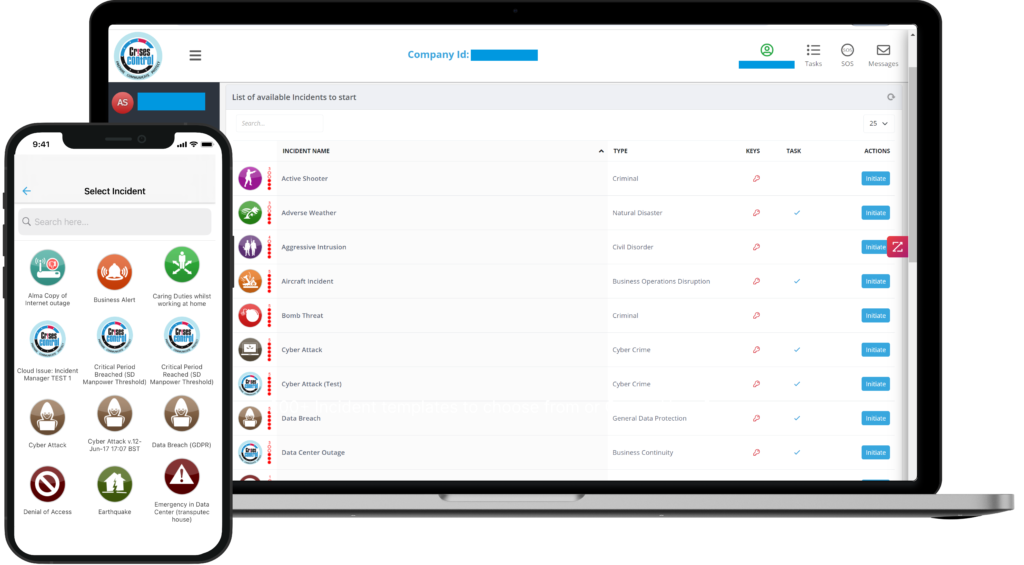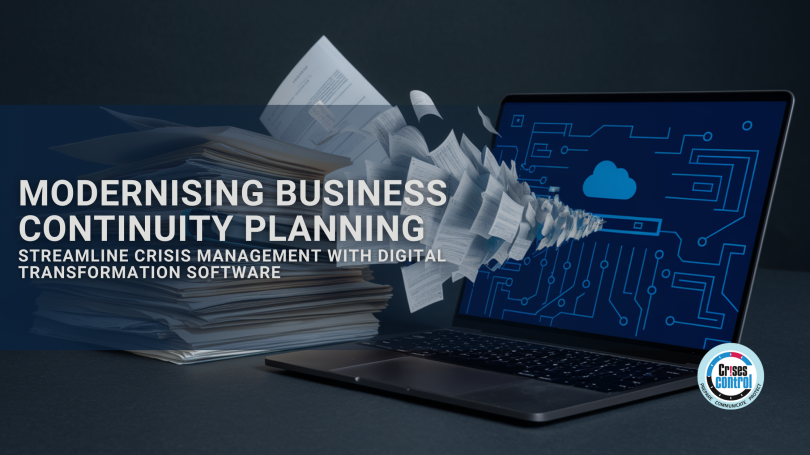Written by Anneri Fourie | Crises Control Executive
Business disruptions can happen unexpectedly, whether caused by cyber threats, natural disasters, or operational failures. For decades, businesses have relied on paper-based continuity plans to prepare for these challenges. However, these traditional methods are proving to be outdated and ineffective in 2025.
In an era where organisations must be quick to respond and flexible enough to adapt to unforeseen events, digital solutions have become essential for managing risk and ensuring business resilience. This blog explores why moving away from paper-based business continuity plans is crucial, the dangers of sticking to outdated methods, and how digital solutions, like Crises Control, can help businesses make the shift to a more effective, future-proof approach.
The Challenges of Paper-Based Business Continuity Planning
Even though business continuity plans (BCPs) are vital for managing risks, many companies still depend on static, paper-based documents. While they may meet basic regulatory requirements, paper plans often fail when disaster strikes, leaving businesses ill-prepared. Here are the key challenges:
1. Accessibility Issues
Paper-based plans are usually stored in physical locations, such as filing cabinets or binders. This makes them hard to access, especially during emergencies when employees may not be on-site. If a crisis occurs outside of regular working hours or in a remote location, teams may struggle to retrieve critical information.
2. Outdated Information and Version Control Problems
Keeping continuity plans up to date is essential. However, managing paper documents can be a hassle. Version control becomes a major issue, leading to outdated, conflicting, or missing information. When every second counts, relying on the wrong version of a plan can cause confusion and delay the response effort.
3. Slower Response Times
In an emergency, time is everything. If a company’s crisis response is based on paper documents, it’s bound to be slower. With manual processes to notify employees, activate incident plans, and coordinate responses, there’s a significant risk of delays. Without digital systems in place, companies often struggle to mobilise resources quickly.
4. Compliance and Audit Risks
Many industries are required to meet strict regulatory standards for business continuity, such as ISO 22301. Paper-based plans can make it difficult to demonstrate compliance, track updates, or provide evidence of testing. This can increase the risk of non-compliance and potential fines or legal consequences.
The Digital Transformation of Business Continuity Planning
The move from paper to digital business continuity planning isn’t just a trend, it’s a transformation that has reshaped how organisations manage risk. Digital business continuity planning software offers a much more dynamic and effective way to handle business disruptions.
1. Real-Time Accessibility and Cloud Storage
One of the key benefits of digital solutions is the ability to access business continuity plans in real-time, no matter where you are. Cloud-based platforms ensure that your plans are available to all employees, whether they are working remotely, from different locations, or on the move. Unlike paper documents, digital solutions are accessible at any time, ensuring teams are always prepared.
2. Automated Incident Response and Communication
With digital solutions, businesses can automate their emergency notifications and response processes. For example, when a crisis happens, employees can be alerted via SMS, push notifications, email, or voice calls. These notifications are sent out quickly, reducing the risk of human error and ensuring that response plans are followed accurately. Digital platforms also allow organisations to assign tasks, track progress in real time, and update the plan as the situation evolves.
3. Continuous Updates and Version Control
One of the biggest advantages of digital solutions is that they allow businesses to keep plans updated at all times. With cloud-based software, changes can be made in real-time and communicated instantly to all stakeholders. This ensures that there’s no confusion about what needs to be done during a crisis, and all employees are working from the most current information.
4. Integrated Compliance and Reporting
Staying compliant with industry regulations is crucial. A digital business continuity plan ensures that businesses can track changes to their plans, maintain audit trails, and generate reports for compliance purposes. This makes the audit process much easier and less time-consuming, reducing the risk of penalties for non-compliance.
How Crises Control Helps Businesses Transition to Digital Business Continuity Planning
Crises Control is a leading provider of business continuity planning software, offering organisations a powerful digital platform to manage risks, automate response procedures, and improve operational resilience. Here’s how it helps businesses modernise their business continuity planning:
1. Cloud-Based Business Continuity Management
Crises Control’s secure cloud platform ensures that business continuity plans are available 24/7 from any location. Employees can access plans on mobile devices, laptops, or desktop computers, so they’re always prepared, whether they’re at the office or working remotely. Unlike paper documents, these plans are always up to date, which removes the risk of using outdated procedures during a crisis.
2. Automated Incident Management and Mass Notification
Crises Control simplifies incident response by automating key processes. The platform sends real-time alerts through multiple channels, such as SMS, push notifications, email, and voice calls. Automated workflows streamline the crisis response, reducing confusion and ensuring that everyone follows the same steps.
Incident management is made more efficient through pre-configured workflows, meaning that teams know exactly what to do and when to do it. This reduces response time and ensures the business can recover faster.
3. Task Manager for Coordinated Crisis Response
In the heat of a crisis, coordination is crucial. Crises Control’s Task Manager allows businesses to assign specific roles and responsibilities to team members, making sure that critical actions are carried out quickly and without delay. This functionality helps prevent any vital steps from being overlooked, ensuring a smoother recovery process.
4. Compliance, Auditing, and Reporting Capabilities
Compliance is streamlined with Crises Control’s built-in features. The platform allows businesses to maintain ISO 22301 compliance, and it provides detailed audit logs that show what actions were taken before, during, and after a crisis. These reports are invaluable for demonstrating compliance with regulations and ensuring that your business is meeting industry standards.

Interested in our Incident Management Software?
Customise your Crisis Incident Management Software to meet your specific needs with our flexible tools & stay connected and informed during the crisis and incident management process
Industries Benefiting from Digital Business Continuity Planning
Crises Control’s platform supports businesses across various industries, each with unique risks and challenges. Here’s how digital business continuity planning benefits different sectors:
Healthcare
In healthcare, continuity plans must be able to respond quickly to emergencies, such as natural disasters, cyberattacks, or supply chain disruptions. Crises Control helps healthcare providers maintain uninterrupted patient care by automating emergency communication and hospital contingency plans. This allows healthcare teams to respond effectively, even in high-pressure situations.
Financial Services
The financial services industry faces unique risks, such as cyber threats and strict regulatory requirements. Crises Control helps businesses in this sector protect against these risks by providing secure, real-time incident management tools. It ensures that financial organisations can maintain business continuity during crises, mitigating the impact on operations and customers.
Manufacturing
Manufacturing companies often deal with complex supply chains, machinery, and logistics. Crises Control helps coordinate responses to incidents like equipment failures or supply chain disruptions, reducing downtime and maintaining production levels. By streamlining communication and task management, Crises Control enables a faster and more coordinated response to crises.
Retail and E-Commerce
For retail and e-commerce businesses, crisis management often involves responding to customer service disruptions, cyberattacks, or inventory shortages. Crises Control’s platform helps companies stay operational during disruptions by automating communication and task management. This ensures that businesses can recover quickly and continue serving their customers.
Government and Public Services
In the public sector, crisis management can involve coordinating emergency response teams, managing natural disasters, or ensuring public safety. Crises Control helps governments and public service organisations manage these complex scenarios by providing real-time coordination, communication, and incident management.
Conclusion: Future-Proof Your Business Continuity Planning with Crises Control
The days of relying on paper-based business continuity plans are behind us. In 2025, businesses need to embrace digital transformation to stay resilient in the face of disruption. By moving to a digital-first approach, companies can improve their response times, reduce human error, and ensure compliance with regulatory standards.
Crises Control offers a robust, cloud-based platform that streamlines incident response, enhances communication, and ensures business continuity across industries. With Crises Control, you can rest assured that your business is prepared for whatever challenges come its way.
Take Action Today
Don’t wait for the next crisis to hit. Modernise your business continuity planning today to ensure your organisation is ready for anything. Contact Crises Control for a free personalised demo and see how our digital transformation software can help your business stay operational, no matter what challenges arise.
Request a FREE Demo









